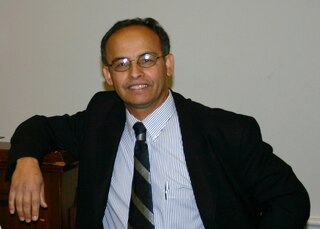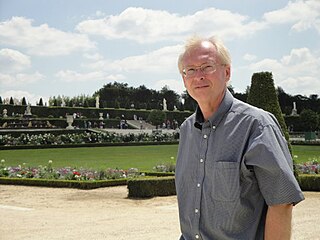
Paul Hermann Scherrer was a Swiss physicist. Born in St. Gallen, Switzerland, he studied at Göttingen, Germany, before becoming a lecturer there. Later, Scherrer became head of the Department of Physics at ETH Zurich.

The Paul Scherrer Institute (PSI) is a multi-disciplinary research institute for natural and engineering sciences in Switzerland. It is located in the Canton of Aargau in the municipalities Villigen and Würenlingen on either side of the River Aare, and covers an area over 35 hectares in size. Like ETH Zurich and EPFL, PSI belongs to the Swiss Federal Institutes of Technology Domain of the Swiss Confederation. The PSI employs around 2,100 people. It conducts basic and applied research in the fields of matter and materials, human health, and energy and the environment. About 37% of PSI's research activities focus on material sciences, 24% on life sciences, 19% on general energy, 11% on nuclear energy and safety, and 9% on particle physics.

Paul K. Chu (朱劍豪) is a specialist in plasma surface modification and materials science. He is Chair Professor of Materials Engineering in the Department of Physics, Department of Materials Science & Engineering, and Department of Biomedical Engineering at City University of Hong Kong.

MIDAS is a data acquisition package developed at the Paul Scherrer Institute, Switzerland, and TRIUMF, Canada. It was designed for particle detectors using CAMAC and VMEbus hardware.

A neutron research facility is most commonly a big laboratory operating a large-scale neutron source that provides thermal neutrons to a suite of research instruments. The neutron source usually is a research reactor or a spallation source. In some cases, a smaller facility will provide high energy neutrons using existing neutron generator technologies.

Mounir Laroussi is a Tunisian-American scientist. He is known for his work in plasma science, especially low temperature plasmas and their biomedical applications.
The index of physics articles is split into multiple pages due to its size.

Daniel M. Fleetwood is an American scientist, inventor, engineer and innovator. He is credited as being one of the first to identify the origins of flicker noise in semiconductor devices and its usefulness in understanding the effects of ionizing radiation on microelectronic devices and materials.
Farhad Rachidi is an Iranian-Swiss scientist.
John Paul Verboncoeur is a professor of Electrical Engineering at Michigan State University, East Lansing, MI. He was named Fellow of the Institute of Electrical and Electronics Engineers (IEEE) in 2013 for contributions to computational plasma physics and plasma device applications.
Emilio Gatti was an Italian engineer. He was a professor of nuclear electronics at the Politecnico of Milan. With Pavel Rehak he invented the silicon drift detector in 1983; he later patented it.
Hermann August Grunder is a Swiss-American nuclear and accelerator physicist. Dr. Hermann A. Grunder was the founding director of Thomas Jefferson National Accelerator Facility and a Director Emeritus of Argonne National Laboratory.
John Robert Cary is a professor of physics at the University of Colorado Boulder and CEO of Tech-X Corporation, which he co-founded in 1994.
Francesca Iacopi is an engineer, researcher and an academic. She specializes in materials and nanoelectronics engineering and is a professor at the University of Technology Sydney. She is a chief investigator of the ARC Centre of Excellence in Transformative Meta-Optical Systems, a Fellow of the Institution of Engineers Australia, and a senior member of Institute of Electrical and Electronics Engineers.

Edl Schamiloglu is an American physicist, electrical engineer, pulsed power expert, inventor, and distinguished professor in the department of electrical and computer engineering at the University of New Mexico. He has been known in public media for his expertise in the design and operation of directed-energy weapons. He is also known for his assessment on the possible origins of alleged health damages presumably caused on U.S. embassy personnel in Cuba in 2016 as part of the Havana syndrome incident. He is the associate dean for research and innovation at the UNM School of Engineering, where he has been a faculty since 1988, and where he is also special assistant to the provost for laboratory relations. He is also the founding director of the recently launched UNM Directed Energy Center. Schamiloglu is a book author and co-editor, and has received numerous awards for his academic achievements. He is a Fellow of the Institute of Electrical and Electronics Engineers and the American Physical Society.

Archana Sharma is an Indian physicist and senior scientist at the CERN laboratory in Geneva, Switzerland. Her research focuses on high energy physics. She is internationally recognized for her work in instrumentation and gaseous detectors, specifically for her pioneering work on micro-pattern gaseous detectors. She received the Pravasi Bharatiya Samman Award in 2023 for her contribution in science and technology.
David William Hertzog is an American particle physicist, known for his research in precision muon physics.
Monica Blank is an American electrical engineer whose research focuses on gyrotrons and their use in generating millimeter-wave radiation for applications including radar and nuclear magnetic resonance. She works for Communications & Power Industries in the San Francisco Bay Area.
Janet L. Barth is a retired American radiation engineer who became the first female chief of engineering at NASA's Goddard Space Flight Center.









